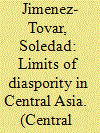| Srl | Item |
| 1 |
ID:
174805


|
|
|
|
|
| Summary/Abstract |
The main aim of this article is to develop a discussion on folklorization or how identity is commodified and reduced to only some cultural traits. Currently, folklorization is one of the main devices in PRC’s cultural and political policies in Central Asia. Authors analyze folklorization both inter-state with a particular focus on Kazakhstan and Kyrgyzstan, and intra-state, with focus on Xinjiang, based on empirical data collected in these countries. The discussion provided is about China’s soft power and how it is projected to Central Asia under the administration of Xi Jinping. Moreover, it is concerned about folklorization as a political tool, utilized by the PRC government to mitigate tensions in the Xinjiang region, but also folklorized landscapes to be found also in Kyrgyzstan and Kazakhstan.
|
|
|
|
|
|
|
|
|
|
|
|
|
|
|
|
| 2 |
ID:
147195


|
|
|
|
|
| Summary/Abstract |
This article shows different ways of defining, understanding and performing ‘diaspority’ in the border region of Kordai (Kazakhstan) and Tokmok (Kyrgyzstan). Taking the example of Dungan people, as the Sinophone Muslims are known in Central Asia, both academic and political definitions of the concept of ‘diaspora’ are compared. This ethnographic account problematizes Kazakhstani Shaanxi Dungan ‘diaspority’. Together with this, the political definitions of ‘diaspora’ are also analysed. I show that while in China and Kazakhstan the definitions of the Dungans as a ‘diaspora’ of ‘China’ are somewhat complementary, once the Shaanxi Dungan emic perspective is taken into account, this concept becomes rather problematic. The kinds of diaspority defined by the states involved are ways of implementing particular cultural hegemonies that legitimate the two political regimes analysed in this article. Concurrently, this dual diaspority is used by the Dungan people in distinct ways in defining their own identities. Nevertheless, I show in this article that the ‘Chinese card’ is not necessarily played by all Dungans. Moreover, there are some Dungans for whom ‘Chinese-ness’ is not even relevant.
|
|
|
|
|
|
|
|
|
|
|
|
|
|
|
|